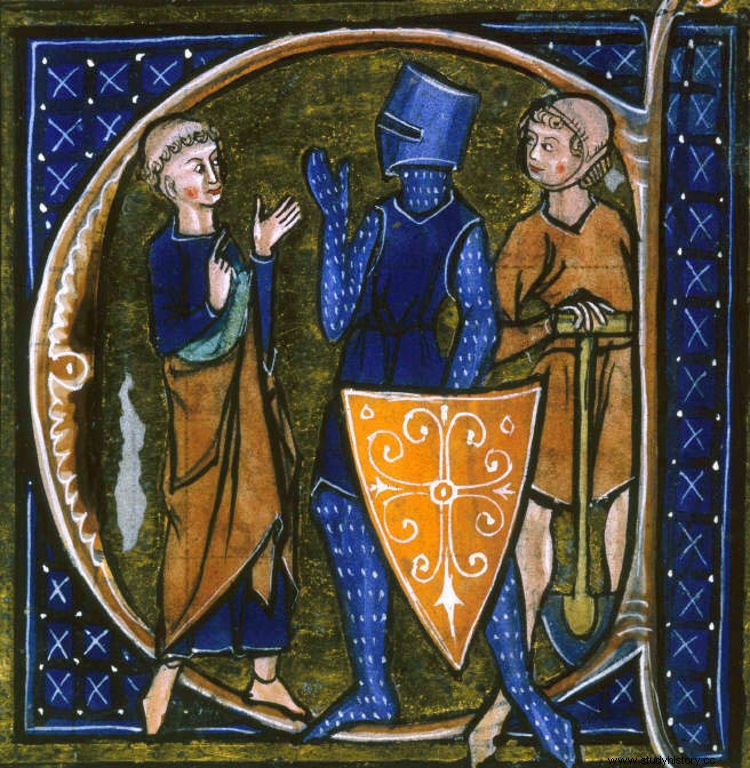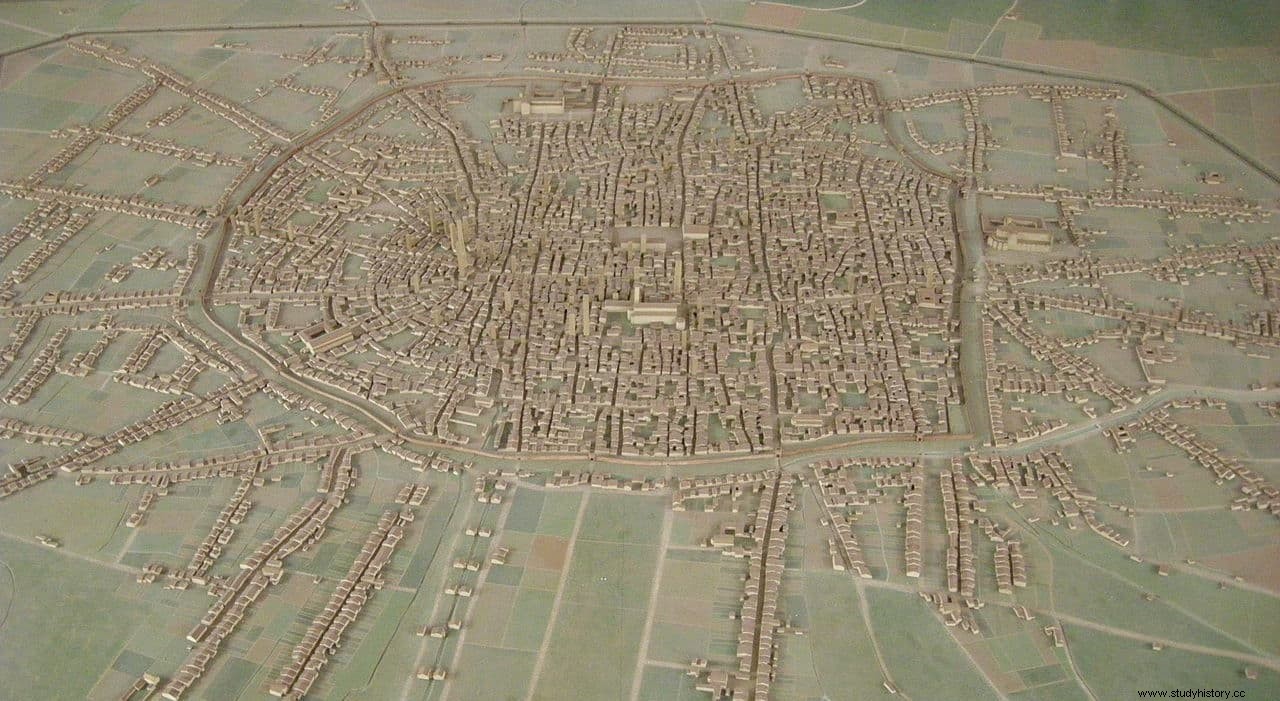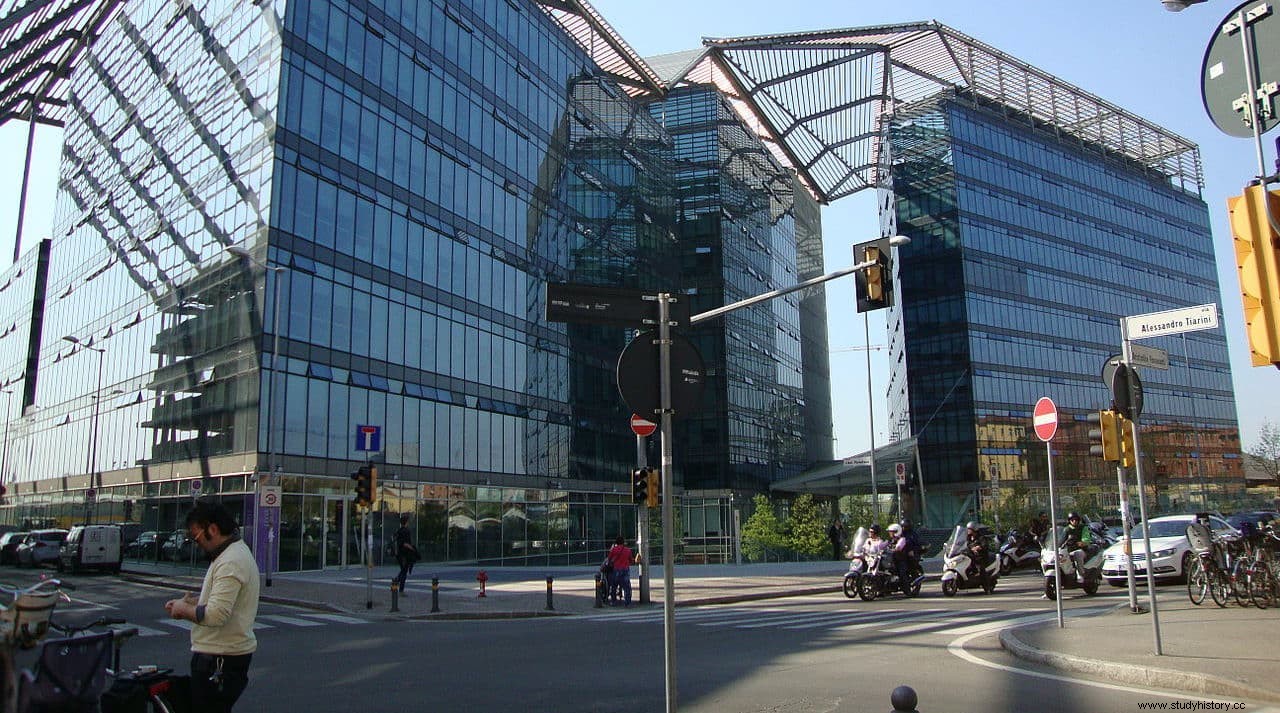Slavery has accompanied Man practically since the beginning of History, probably when he became aware of how practical and profitable the use of prisoners of war as labor could be. The existence of this institution was always assumed to be something natural and, in fact, it formed the basis of the economy in ancient times. Only in the Middle Ages did it enter into crisis when it was displaced in importance -not replaced- by serfdom. One and the other survived until the third quarter of the 19th century despite the movements that arose for their abolition. And the first was probably the Liber Paradisus .
The so-called crisis of the third century AD. marked the beginning of the decomposition of the Roman Empire. Of course, it would still last but that period, which lasted for about fifty years, influenced practically all fields, from the political to the social through the economic. In the latter, the increasing difficulties in collecting taxes led the emperors to be forced to collect often in kind and to devalue the currency, which led to increasing price inflation.
This had repercussions in all sectors of the economy, impoverishing trade, weakening industry and causing a strong recession that no longer had its usual lifeline, the one provided by the foreign provinces, because the pressure of the barbarian peoples had forced a reduction of borders. and the ability to act outside. Thus, the large estates devoted themselves to self-sufficient production, with merely local commercial exchanges. Many commoner citizens became poor and had to emigrate to the countryside where, lacking their own land, they had to enter the service of landowners.

Working plots for rent, hereditarily linked to it and without the right to abandon it, they were the ones who constituted the colonato, an intermediate step between slavery and the way of life that was to come, feudalism, once the slaves were circumscribed mainly to mining. As is known, the feudal system was the one that characterized the Middle Ages and its social base was a new class, that of the serfs, who were one step beyond the settlers.
The serfs derived from the settlers by an edict of Constantine in the year 322 that regulated their figure, establishing a series of duties such as almost total submission to the seigneurial authority, but also rights, such as not being able to be evicted or see increased relationship conditions with their lords. Thus, the serfs differed from the settlers in having the legal status of free men, although that freedom was quite limited and subject to whoever they served, whether civil (a nobleman) or religious (a monastery or convent).
As always, the changes that history brought made serfdom end up disappearing in favor of other socioeconomic structures, although in some places like Russia and other Eastern European countries they survived until the aforementioned second half of the nineteenth century. But for centuries it was the basis of feudalism and so it was in 13th century Italy when the unexpected result of a battle led Bologna to promulgate a completely unprecedented body of legislation.
It was in the context of the war between the Guelphs and the Ghibellines, that dispute that Frederick Barbarossa had begun in 1154 by incorporating the north of the Italian peninsula into the Holy Roman Empire, to which the Holy See opposed, even settling the matter by middle of the guns. The prelate's supporters were called Guelphs, a word etymologically derived from the German welfen , while the Ghibellines or waibibglen They supported the emperor. Milan, Florence or Mantua were among the first, with Siena, Pisa, Lucca among the second…
The conflict lasted beyond the lives of both contenders and polarized the politics of all those cities. In this context, the Battle of Fossalta was fought, in which the Guelph Bologna and the Lombard League faced the Ghibelline Cremona and Modena, revealing a rivalry that had been growing for decades and would still leave episodes later, as we saw in the article dedicated to another battle, that of Zappolino. But in 1249 the hot spot was Fossalta, a small town located along the Panaro River, a tributary of the Po.
The Lombard army, made up of three thousand knights and two thousand infantry under the command of the Marquis of Ferrara, marched on Modena, whose inhabitants requested help from Cremona, where the illegitimate son of Federico II Hohenstaufen, the imperial vicar Enzio of Sardinia, resided. This one gathered fifteen thousand men and went out to meet the enemy, meeting him and taking positions for several days without either of the two contenders deciding to take the initiative. Finally, the imperial side was divided into three bodies arranged in two lines in front of the others, which divided into four but in a single line.

This was the state of affairs when the Guelph general, Filippo Ugoni, received another two thousand reinforcements and launched himself into the attack at dawn on May 26, sending out successive waves that the Ghibellines resisted but progressively weakened until, as the day wore on, Enzio was thrown from his horse; then the battered Imperial lines were broken and massacred during the chaotic retreat. Four hundred knights were taken prisoner and paraded through the streets of Bologna, including the emperor's own scion, who despite his attempts to escape and the negotiating offers of his father would never regain his freedom.
The Battle of Fossalta was useless neither militarily nor politically. However, given that most of the signorie of the region had perished or been imprisoned, an unusual situation was presented until then, with a certain power vacuum that returned to the communal institutions their powers in the government of the cities, until now more or less illegitimately subordinated to the authority of those gentlemen. Rich aristocrats, often of feudal origin, of which the most important received the title of duke from the emperor -sometimes they bought it- and controlled at will the political decisions of governments, turned into puppets before their wealth and power.
The signorie tended to create dynasties that passed power from father to son and in the imperial zone there were surnames such as the Milanese Sforza and Visconti, the Mantuan Gonzaga or the Florentine Médici, to name the most renowned, while on the pontifical side the Urbinese Della Rovere or the Bolognese Bentivoglio. And, suddenly, many of them had disappeared or seen their wings clipped, giving rise to an ethical reflection on the part of intellectuals about their position and that of the silenced servitude.
That is why at the end of August, just three months after the battle, the bell of the Palacio del Podestá (the building that served as the town hall) rang to summon the citizens of Bologna to the Plaza Mayor. Once the people had gathered, Bonaccorso da Soresina, who was the podestá, made an appearance. (the chief magistrate), accompanied by the capitano del popolo (the magistrate who mediated between the bourgeois government of the commune represented by the podestá and the noble authority), and to the astonishment of the crowd, they announced the release of about six thousand serfs who belonged to the four hundred absent lords.
The commune itself would bear the cost, paying ten silver lire for each individual (eight in the case of children) at the market price. The personal number of freed serfs was five thousand eight hundred and fifty-five, which meant a disbursement of fifty thousand and fourteen lire for the city. An unprecedented operation that was baptized as Paradisum voluptatis , referring to the phrase «Paradisum voluptatis plantavit dominus Deus omnipotens aprinciple, in quo posuit hominem, quem formaverat, et ipsius corpus ornavit veste candenti, sibi donans perfectissimam et perpetuam libertatem» (In the beginning, the Lord planted a paradise of delights, in which he placed the man he had formed, and adorned his own body with a shining robe, giving him perfect and perpetual freedom.)
The prestigious jurist and notary Rolandino de Passaggeri, leader of the Bolognese Guelphs, also spoke to the people with an emotional speech explaining the initiative:

Rolandino was one of the four notaries who drew up the document with which the Paradisum voluptatis was written. That text, which included the names and data of all the freed serfs, is called Liber Paradisus for the reasons indicated and is considered the first decree of abolition of slavery, although strictly speaking it did not affect slaves exactly but rather serfs of the gleba. The Liber Paradisus It is preserved in the Archivio di Stato di Bologna e Sezione di Imola , located in Piazza Celestini 4, and has given its name to the square where that massive redemption was proclaimed.
Now, as things are not usually simple, and even less so in History, it seems that this beautiful episode was not as altruistic as it might seem a priori . First, because it was becoming increasingly clear that free workers yielded more. Second, because the old laws that exempted freedmen from taxes had been abolished and this meant that most of those six thousand individuals would have to pay taxes, hence at the same time that they were granted freedom they were prohibited from leaving their homes. respective dioceses and remain within the territory of the Commune of Bologna.
Some, yes, got together to found new towns, with names alluding to their origin; this is the case of Castelfranco Emilia, which etymologically derives from castle, franco (free) and Emilia (a region where Piacenza, Parma, Reggio Emilia, Modena and Ferrara were, and which today has merged with Romagna). They were pioneers without knowing it.
Fonts
History of Rome (Sergei Ivanovich Kovalyov)/The transition from slavery to feudalism (VVAA)/The towns of Italy in the later Middle Ages (Trevor Dean)/A companion to medieval and renaissance Bologna (VVAA)/Wikipedia
